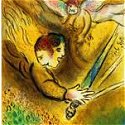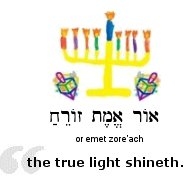|
CHANUKAH IS A REMINDER THAT WE MUST REMAIN COMMITTED to the truth in a godless, and therefore insane, world. After all, since ultimate reality is the "handiwork" (i.e., conscious design) of a single, all-powerful, all-knowing, all-loving, morally perfect, purposive, personal, and spiritual Agency that has been revealed in the Jewish Scriptures, those who deny this Reality are living in a state of delusion (that is, a protracted "hallucination" that indicates radical departure from what is real). In a sense, the history of humanity - especially as it has been expressed philosophically and politically -- has been nothing less than the conscious collusion to redefine reality as something that it isn't. "The kings of the earth station themselves, and the dignitaries (ОеОЋо╣Оќо░Оао┤ОЎОЮ) take counsel together against (lit. "over") the LORD and His Mashiach" (Psalm 2:1-3). Spiritual warfare is therefore the fight for sanity and truth in a world that prefers madness and self-deception.
Despite being an anti-Semite, the early Church father Tertullian (160-220 AD) once asked a very good question: "What does Athens have to do with Jerusalem?" He was right for asking the question, though ironically, as a Greek-minded "replacement theologian," he was wrong for categorically libeling the Jewish people (see Adversus Iudaeos, c. 200 AD). Historically speaking, religious Jews have always loved the Torah and resisted the pull toward assimilation... Indeed, what other nation has survived over the millennia as have the Jewish people? Sadly, it is a continuing sin of many of today's "church leaders" to disregard the miraculous existence of Israel - including the modern State of Israel - by refusing to give the LORD God of Israel glory for His faithfulness.... Look, if God isn't faithful to the promises made to ethnic Israel, what makes these people think He won't change His mind regarding the Church? But I digress here...
Historically, Chanukah remembers the Maccabee's resistance to the coerced Hellenization (i.e., the spread of pagan Greek culture) of the Jewish people, though more generally it represents the ongoing struggle against assimilation to the prevailing "world system." In modern day America, for instance, the pressure to assimilate takes the form of "political correctness" and the acceptance of official propaganda that multicultural pluralism/cultural relativism is the truth. For those of us who follow Yeshua, Chanukah is the bold proclamation that the Light of the World has come, despite the face that "people loved darkness rather than light because their deeds were evil" (see John 3:19).
The story of Chanukah goes back to ancient Greece and the pagan worldviews of Hesoid and Homer, Plato and Aristotle. Alexander the Great (r. 336-323 BC), the tutelage of Aristotle, became a militant King of Macedon who swept across Syria, Egypt, and Babylonia to defeat the mighty Persian Empire. Alexander's rapid military conquests extended Greek culture and influence throughout the civilized world. When he later died (323 BC), Alexander's kingdom was divided into four parts and the land of Israel became a province of Syria under the rule of the Seleucid dynasty.
In 175 BC, a new king, Antiochus IV (also called "Epihpanes") ascended the throne in Syria. Under the "auspices" of his regime, Jerusalem began to look more and more like a Greek city as Hellenistic culture was officially promoted. Antiochus allowed Hellenistic Jews to have prominent roles in the Holy Temple - so much so that even a non-priest (named Menelaus) was given the role of being the Temple's Kohen Gadol (High Priest). This enraged many Jews, however, who then called for Egyptian rule instead of Syrian (the Egyptians were more tolerant of local customs and did not force Hellenization). Later, when Antiochus returned from an unsuccessful military campaign against Egypt, he decided to quell the Jewish call for Egyptian rule and murdered some 40,000 people in Jerusalem. Soon after this, he decreed that Jews must abandon their faith in the Torah and to cease offering sacrifices in the Temple. The Holy Temple itself was desecrated and images of the god of Zeus (the "sky god") were placed on the altar and in the sanctuary. Pagan altars were soon erected throughout Judea and pigs were regularly sacrificed upon them. The study of Torah was outlawed (as well as the observance of Shabbat, holidays, and ritual circumcision), and the penalty for disobedience to these decrees was death.
Many Jews fled and hid in the wilderness and caves and many died kiddush HaShem - as martyrs (see Heb. 11:36-39). Eventually Jewish resistance to this imposed Hellenization meant literal war. In 164 BC, in Modin, a small town about 17 miles from Jerusalem, Mattityahu (Matthias), a Hasmonean priest, and his five sons took refuge. When Antiochus' soldiers arrived at Modim to erect an altar to Zeus and force the sacrifice of a pig, Mattityahu and his sons rose up and killed the Syrians. They then fled to the Judean wilderness and were joined by other freedom fighters. After some organizing, they soon engaged in successful guerrilla warfare against their Syrian/Greek oppressors.
Mattityahu died about a year later and his son Judah became the leader of the resistance. Judah came to be known as the "Maccabee" -- a title that either was an acronym of the phrase, mi komocha ba'elim Adonai, "Who is like You among the gods, LORD?" (Exod. 15:11) or else was derived from the Hebrew word for "hammer" (makevet), indicating his ferocity in battle. According to legend (Shabbat 21b), on the 25th of Kislev, three years to the day after the Syrian/Greeks had defiled the Holy Temple by making it a shrine to Zeus, the Maccabees vanquished their oppressors and recaptured the Temple. When the faithful Jewish priests searched for the holy olive oil to light the menorah, however, they found only one jar that was not defiled (i.e., only one still had the seal of the High Priest). The oil in this jar was sufficient to burn for only one day, and it would take eight days until a new supply could be produced. According to tradition, the one-day supply of oil miraculously burned in the menorah for eight days, and later, this eight day period was commemorated as Chunukah, "Dedication," also known as the Festival of Lights.
Interestingly, Chanukah is mentioned only a couple times in the Talmud (i.e., Shabbat 20a, 21b), perhaps because the Maccabean dynasty (the forefathers of the Sadducees) eventually became entirely corrupt, and the Talmud (which grew out of Pharisaic tradition) did not want to draw much attention to them. Therefore the Talmud's statements (recorded centuries after the Maccabean rebellion) focus on the miracle of the oil rather than on the merits of the Maccabean resistance. This approach has been adopted in normative (rabbinical) Judaism, and today Chanukah primarily centers on the miracle of the lights (i.e., the lighting of the candles) rather than the militant overthrow of religious persecutors.
Chanukah is alluded to in the Torah itself. First, the 25th word of the Torah is or, "light," as in "Let there be light" (Gen. 1:3), and some of the sages say that this suggests Kislev 25. Second, immediately after the festivals (moedim) of the Jewish year are enumerated in Leviticus 23, the commandment to "bring clear oil from hand-crushed olives to keep the menorah burning constantly" is given (see Lev. 24:1-2), and this again is said to foresee the time of Chanukah.
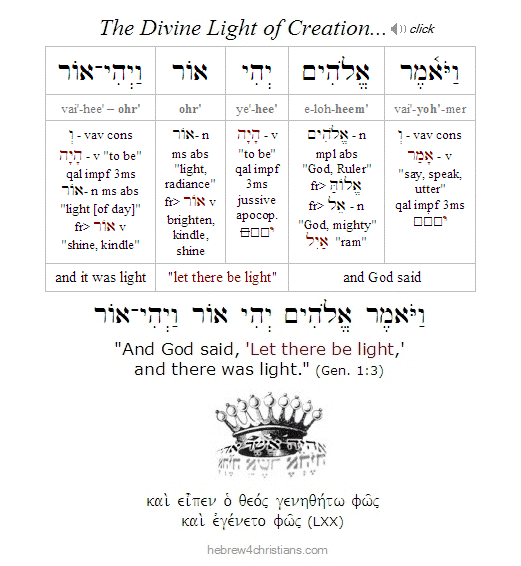 |
Some Bible scholars say that the prophet Daniel foresaw the events of Chanukah centuries beforehand in a vision of a "male goat running from the west" with a conspicuous horn between its eyes (Alexander the Great) that was broken into four (Dan. 8:1-12). Out of the four horns arose a "little horn" (Antiochus) who greatly magnified itself, cast down some of the stars (righteous souls), took away the sacrifices, and cast down the sanctuary in Jerusalem. Years after the Maccabean revolt, Yeshua celebrated Chanukah in the same Temple that had been cleansed and rededicated only a few generations earlier (John 10:22). It was here that many asked if He were the coming Messiah -- harkening back to the liberation of the earlier Maccabees. During a season of remembering miracles (nissim), Yeshua pointed out that the works that He did attested to His claim to be the long-awaited Mashiach of the Jewish people (John 10:37-38).
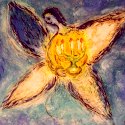
Finally, in an eschatological sense "Epihpanes" foreshadows the coming time of the "Messiah of Evil" (anti-christ) who will one day attempt to "assimilate" all of humanity into a "New World Order" (Dan. 9:27, 2 Thess. 2:3; Rev. 13:7-9, etc.). At first he will appear to be a "world savior" who will broker peace for Israel and the Mideast, but after awhile, like his archetype Epiphanes, he will savagely betray the Jewish people and set up a "desolating sacrilege" in the Holy Place of the Temple (Matt. 24:15). His satanic rise will occur during acharit hayamim - the "End of Days" - otherwise called the period of the Great Tribulation (Matt. 24). The Final Victory of God will be established when Yeshua returns to destroy this Messiah of Evil at His Second Coming. The Holy Temple will then be rebuilt and dedicated by the hand of the true Messiah of Israel...
Practically speaking, the word chanukah (ОЌо▓ОаОЋо╝ОЏо╝оИОћ) means "dedication," a word that shares the same root (ОЌоИОаоиОџо░) as the Hebrew the word chinukh (ОЌо┤Оао╝ОЋо╝Оџо░), meaning "education." Just as the Maccabees fought and died for the sake of Torah truth, so we must wage war within ourselves and break through the stronghold of apathy and indifference that the present world system engenders. We must take time to educate ourselves by studying the Torah and New Testament, for by so doing we will be rededicated to the service of the truth and enabled to resist assimilation into the corrupt world. Love not the world, neither the things that are in the world... (1 John 2:15). The "cleansing of the Temple" is a matter of the heart, chaverim. The enemy is apathy and the unbelief it induces. We are called to "fight the good fight of faith" and not to conform to this present age with its seductions and compromises (1 Tim. 6:12, Rom. 12:2).
Therefore let me wish you a joyful time of celebrating the true and everlasting victory of the Light of the World, our LORD Yeshua. Amen. (John 1:5).
ОћоИОљОЋо╣Ое ОъохОљо┤ОЎОе ОЉо╝оиОЌОЕОЂоХОџо░ ОЋо░ОћоиОЌОЕОЂоХОџо░ ОюОљ Оћо┤ОЕо╝Оѓо┤ОЎОњОЋо╣
ha-ohr ┬и me┬иir ┬и ba┬иcho┬иshekh, ┬и ve┬иha┬иcho┬иshekh ┬и lo ┬и his┬иsi┬иgo

"The light shines in the darkness, and the darkness will never overcome it"
(John 1:5)
╬║╬▒рйХ ¤ёрйИ ¤єр┐Х¤ѓ р╝љ╬й ¤ёр┐Є ¤Ѓ╬║╬┐¤ёрйирЙ│ ¤є╬▒рйи╬й╬х╬╣, ╬║╬▒рйХ р╝А ¤Ѓ╬║╬┐¤ёрйи╬▒ ╬▒рйљ¤ёрйИ ╬┐рйљ ╬║╬▒¤ёрй│╬╗╬▒╬▓╬х╬й
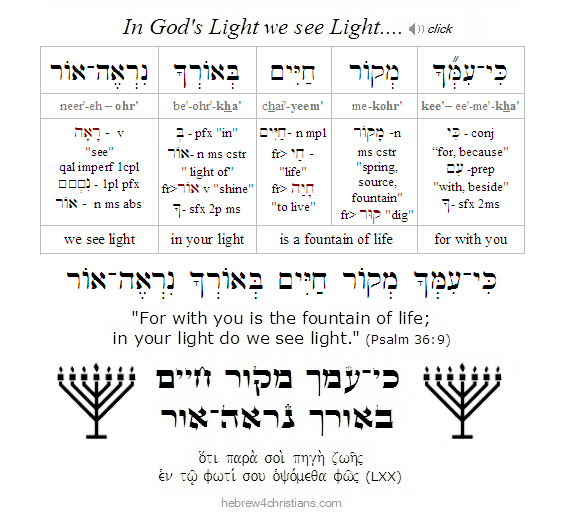
|

